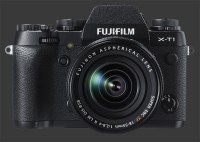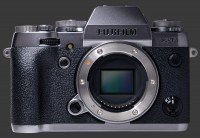Fujifilm X-T1 Graphite Summary
Fuji X-T1 Graphite Assessment
NOTE This is the same assessment as for the X-T1
Fujifilm X-T1 since these cameras are identical except for color and their maximum shutter-speeds. Read the hands-on below for a quick report below or the full-review of the X-T1 here.
The Fuji X-T1 Graphite pairs a 16 megapixels X-Trans CMOS II sensor with a revised EXR II processor. This capable combination delivers class-leading image-quality when it comes to noise, retention of details and also dynamic-range.
The new sensor features a hybrid Phase-Detect and Contrast-Detect autofocus mechanism. This lets the X-T1 Graphite focus very quickly in good light when Phase-Detect can do all the work but slows down considerably when Contrast-Detect is used to move the lens back-and-forth until focus is found. This is not ideal for moving subjects. However, the X-T1 offers the most MF-assist modes of any camera, including a unique mode which shows a magnified portion of the image next to the full-image.
The two headline changes over previous mirrorless Fujis are a huge 2.4 megapixels EVF with 100% coverage and 0.77X magnification, plus a sturdy weather-sealed and freezeproof body. The former offers a truly spectacular view rivaling OVFs while the latter remains to be realized until weather-sealed X-mount lenses become available.
The Fuji X-T1 Graphite offers an incredible amount of external controls, including dual control-dials, plus dials for ISO, EC and Shutter-Speed. Combined with a lens aperture-ring found on most X-mount lenses, this gives the X-T1 direct controls over every important photographic setting. Many of these controls are however frustrating while using gloves since they barely protrude from the camera.
| PROS | CONS |
|---|---|
| Extremely low image noise up to ISO 6400 | Buttons too flush with body and unusable with gloves |
| Excellent retention of details and sharpness | Autofocus gets slow in low-light |
| Superb dynamic-range | Slow continuous AF |
| Very reliable metering | Not Exposure-Priority |
| Natural image colors | Video recording delay |
| Good automatic white-balance | Overly sensitive Eye-Start sensor |
| Spectacular EVF | Soft dial detents |
| Truly helpful MF-assist modes | Sometimes very slow to power off |
| Class-leading 1/32000s maximum speed | Soft aperture detentsWith all but one XF-mount lens to date. |
| Plenty of direct controls | |
| Excellent build quality | |
With its professional features and top-notch image-quality, the Fuji X-T1 Graphite is very promising. Those who are careful enough with its controls and do not shoot in the cold should find this an extremely rewarding mirrorless camera. With a growing lineup of lenses, including a disproportionately high number of quality lenses, the Fuji X-T1 Graphite can create superb images for a variety of subjects.
Recent Similar Cameras
Fujifilm X-T1 Graphite Fuji X-T1 Graphite HandsOn
The Fuji X-T1 Graphite represents the latest step in Fuji's continuous refinement of their line of premium digital cameras. Fuji has been improvement the performance and usability of several of their X-series models via the introduction of exceptionally frequent firmware upgrades.

With the Graphite Edition of the X-T1, Fuji unveiled a notable upgrade to the original model and is celebrating it with a new finish. The new X-T1 Graphite gets a smooth and extra-durable 3-layer coating. A 6-stage process takes applies the special coating which is designed to protect the camera and give it a distinct semi-glossy look, making the X-T1 Graphite stand out even more than its predecessor.
This new shade of X-T1
Fujifilm X-T1 features a number of improvements, including the fastest electronic shutter among large-sensor cameras. Photographers can now choose between a typical mechanical-shutter and a new electronic-shutter, or let the camera automatically decide which to use. The electronic-shutter supports a maximum shutter-speed of 1/32000s and a minimum one of 1s. Only standard ISO sensitivities are allowed with the new shutter, so not all shots are possible without using the mechanical-shutter.
Having an ultra-fast electronic-shutter makes it possible to capture scenes in bright light with the use of extraordinarily-wide apertures, where typical cameras would overexpose. However, it does not help much with extremely fast action since the sensor read-out is not instantaneous. This is the same issue of the infamous jello-effect seen in digital video cameras. The new electronic-shutter also makes the Fuji X-T1 Graphite incredibly quiet.

Classic Chrome Film Simulation and Natural Live-View make their debut on the X-T1 Graphite. These will also be available as a firmware upgrade to existing X-T1 cameras. The Classic Chrome mode is a new Film Simulation which is designed to mimic the look of reversal film. This is characterized by a soft and subdued look with low contrast and low saturation. Natural Live-View is an oxymoron. It is a mode where Live-View attempts to mimic what would be seen through an optical viewfinder, ignoring how an image is rendered. This may be of use to those who shoot RAW and intend to perform their own image-conversion.
Outside of the new finish, the X-T1 Graphite physically is an X-T1. It is built around the same 16 megapixels APS-C X-Trans CMOS II sensor with built-in Phase-Detect AF and features the same EXR II processor. The control layout is absolutely identical. This translates into exactly the usability experience of the original X-T1.
With a huge number of dials and external controls, these professional-grade mirrorless cameras are overly complex. One only needs 3 dials to completely control exposure on a digital camera, yet the X-T1 has no fewer than 5, excluding the aperture-ring found on most Fuji X-mount lenses! These dials partially control parameters in ways that overlap. Both the Shutter-Speed and ISO dial are particularly problematic. The former only sets speeds in full stops for a subset of the camera's range, while the latter is missing one expanded sensitivity.
The main ergonomic complain for the X-T1 in our original review is that buttons are too flush with the camera body. This makes them nearly impossible to operate while wearing gloves. This does not affect everyone yet is a common concern in winter around here. The Graphite Edition does not change any of this.
Once one gets use to the complexity of this interface and its quirks, the Fuji X-T1 becomes an outstanding digital camera. Image-quality is top-notch with extremely low image-noise and excellent dynamic-range. Captured details are truly superb and the metering system is highly reliable. The X-T1 Graphite is quite fast and responsive too.
Just like its single-color twin, the Fuji X-T1 delivers one of the most compelling image-quality among digital cameras. It does so from within a relatively compact and highly durable body. This is exactly what many advanced photographers are looking for.
Please Support Neocamera
All information on Neocamera is provided free of charge yet running this website is a huge endeavor. Purchases made via affiliate links found throughout the site help keep it running and up-to-date. There is no additional cost to you, so please consider buying via these links to our affilates:
If you found any information on this site valuable and did not purchase via our affiliate links, please considering donating via PayPal:
Any amount will be greatly appreaciated. Thank you for your support!
Fujifilm X-T1 Graphite Highlights

Sensor-Size: 24 x 16mm

Actual size when viewed at 100 DPI
| 16 Megapixels Mirrorless | ISO 100-51200 |
| Fujifilm X Mount 1.5X FLM | Shutter 1/32000-30s |
| 0.50" Built-in EVF 2.4 Megapixels (0.77X) | Full manual controls, including Manual Focus |
| Automatic Eye-Start sensor | Custom white-balance with 2 axis fine-tuning |
| 1 Axis Digital Level | Spot-Metering |
| Weatherproof down to -10C | Hot-Shoe |
| Built-in Dust Reduction | Stereo audio input |
| 8 FPS Drive, 47 Images | Lithium-Ion Battery |
| 1920x1080 @ 60 FPS Video Recording | Secure Digital Extended Capacity |
| 3" LCD 1 Megapixels |
Updates
2025.01.18

Fujifilm GFX 2025 Lens Roundup
Lens Review roundup of Fujifilm GFX Medium-Format lenses. Quality, performance and handling of the GF20-35mm F/4R WR, GF30mm F/3.5 Tilt-Shift and the GF55mm F/1.7.
2024.11.18

Best 2024 Photography Gifts for Every Budget
Great gifts for photographers and photo enthusiasts selected for every budget among the best products of 2024.
2024.08.07

Eye Protection Tips for Professional Photographers
The four main considerations for professional photographers regarding eyewear.
2024.07.14

Fujifilm X100VI Review
Flagship fixed-lens compact digital camera with a 40 MP sensor and Image-Stabilization, a first for the series. Retro design featuring dual control-dials, plus direct ISO, Shutter-Speed and EC dials. Its hybrid viewfinder can switch between EVF and OVF mode.
2024.05.09

Fujifilm GFX100 II Review
Flagship 102 Megapixels Medium-Format Mirrorless Digital Camera with 8-Stop 5-Axis IBIS, 8 FPS Drive, 8K Video and 400 MP Super-Resolution capture in a weatherproof and freezeproof body with dual control-dials and dual memory-card slots.
2024.04.03

Fujifilm X-T5 Review
Newest Fujifilm flagship boasting a 40 MP APS-C sensor, 5-axis IBIS with 7-stop efficiency, 15 FPS continuous drive, 6.2K Video capture, dual control-dials and dual SDXC UHS-II slots in a sturdy weatherproof and freezeproof body.
2023.11.20

Best Digital Cameras of 2023
Find out which are the Best Digital Cameras of 2023. All the new Mirrorless Digital Cameras from entry-level to high-end professional.
2023.07.10

Fujifilm X-H2 Review
40 Megapixels APS-C Hybrid Mirrorless Digital Camera with 7-stop IBIS. Fastest shutter ever and 8K video capture. Large builtin EVF with 0.8X magnification and 5.8 MP, plus an Eye-Start Sensor. Packed with features and large number of controls in a weatherproof and freezeproof body.
2023.05.07

Sony FE 20-70mm F/4G Review
Review of the unique Sony FE 20-70mm F/4G lens. The optical zoom of this lens spans ultra-wide-angle and medium focal-length coverage, making it one of the most versatile Full-Frame lenses on the market.
2023.01.15

Huion Inspiroy Dial 2 Review
Review of the Huion Inspiroy Dial 2 tablet, a medium sized drawing surface with dual dials and customizable buttons. Connects via USB-C or Bluetooth 5.0 with Windows, Linux and Android support.
2022.12.08

How to Pack for a Photo Trip
Find out how to pack for a travel photography trip, carry your gear safely while meeting airline regulations.
2022.11.13

Best Digital Cameras of 2022
The best digital cameras of 2022. A short list of the most outstanding models in their respective categories. Choose one for yourself or as a gift.
















